- Home
- David Pilling
The Path of Sorrow Page 11
The Path of Sorrow Read online
Page 11
By contrast, the Northerners looked like a mob of beggars that had shambled onto the field by accident. Here and there a rich noble stood out, though even their gear was spotted with rust, but by and large they looked like what they were. Waifs and strays, harried fugitives from their native land, armed with the weapons they had carried with them when they fled, or otherwise managed to beg, steal, or borrow.
I don’t want to die here, thought Felipe, far from home and ambition and honour. The Gods cannot have spared me so often, and let me achieve my grey hairs, just to kill me in this place.
And then the drums started to beat.
SORROW
The Moon-Walkers moved north, travelling by night —as was their custom— under the light of the waxing crescent in the sky. Though lethargic and diffident during the day, necessary if they were to conserve energy, at night their long limbs swiftly ate up the miles.
Moving two by two, in loose order with their spears and bows slung across their broad backs, the quick pace of the Moon-Walkers was hindered slightly by the slave wagons. These creaking, heavy cages on ancient spoked wheels, which threatened to fall off their axles as they shuddered over the rough ground, were dragged by teams of mules. Stubborn and truculent, the beasts had to be lashed into action, and the moon-lit world echoed to the pitiful sound of their braying.
No less pitiful were the slaves inside the cages. Each enclosure was stuffed with human flesh, as much as could be packed aboard without suffocating the merchandise. The Moon-Walkers were alien to notions of pity over profit, and thought nothing of caging women and children alongside the men, which was why Sorrow had been shoved into a corner alongside three captured warriors from a rival tribe to the Moon-Walkers.
He need not have worried. The men were all big, gaunt, and muscular, but they were no threat to him or anyone else. Something about being in captivity seemed to have broken their spirit, and they barely acknowledged his presence. Sorrow, who had been taught to be a good observer, noted their dark skin, uncut black hair and beards, as well as their shabby bleached tunics, and wondered at their language. The warriors barely spoke or even lifted their heads, but when they did it was to mutter darkly to each other in a deep coarse tongue that was quite unlike the sing-song accents of their captors.
Sorrow’s emotions at being betrayed and sold into slavery were difficult to fathom. Most people would be enraged and desperate for revenge, but his upbringing and temperament discouraged such things. His tribe had believed that the cycle of life was mirrored in all things, including the consequences of one’s actions. Thus he had no need to be angry at Bail or to burn for revenge, for sooner or later the consequences of Bail’s folly would come back to bite him. If anything, Sorrow felt disappointed in someone he had thought of as a friend, and slightly baffled that the long-held Prophecy of the Crooked Man should end in such a squalid piece of treachery.
To take his mind off these difficult subjects, Sorrow made a careful study of the changing landscape. In his short life he had never travelled so far north, though his tribe had also been nomads, and was curious to see if the legends of the extreme north of Temeria matched up to the reality.
From the tales he had learned at his mother’s knee, Sorrow knew the country they were passing through as The High Places. It was an apt name for, as the tribe moved further north, the dry land steadily rose about them like the ripples of a swelling sea. Flat stony desert gave way to soaring crags and rocky bluffs, dividing the land into a series of narrow gloomy chasms, through which the Moon-Walkers passed like a line of ants, dwarfed by the mountainous landscape.
By night the surrounding cliffs were little more than jagged silhouettes, but during the day Sorrow fancied that they were trapped inside an endless cave. Only a thin slit in the roof of the world, a glimpse of blue skies far above, served as a reminder that they were still in the open. Occasionally he saw a castle, lonely towers clinging to the lip of some high ledge, and shuddered as he wondered what kind of people might inhabit such places.
The temperature also began to drop, causing a few of the more spirited prisoners to complain, and the Moon-Walkers grudgingly threw them some stinking furs to warm their bodies.
Only once did Sorrow attempt to speak to one of his fellow prisoners. “Where are they taking us?” he asked the man to his right.
He, who until then had been sitting with his head in his hands, no doubt thinking bitterly about the wife and children he would never see again, lifted his head to look at Sorrow with savage red-rimmed eyes.
“Gar-Karu-Junta,” he said, and a mirthless smile crawled up one side of his hairy face as he saw Sorrow did not understand. He turned to his fellows and gabbled some more of the strange language, giggling in obvious mockery of Sorrow, but they weren’t interested. Both men were too lost in their own bitter thoughts, and didn’t even raise their greasy heads.
“The Gar-Karu-Junta,” said a tired voice in the pure, exotic accent of Central Temeria, “it means the Peak of the World, and was a term coined by ancient explorers who thought that this land marked the end of the civilised world. Nothing further north but sea and ice. They were wrong, as we now know.”
Biting his lip at the weight of the manacles on his wrists and ankles, Sorrow tried to lean forward to get a view of the speaker. The man in question was at the opposite end of the cage, a bony wrinkled figure clothed in ragged breeches, a villainous shirt and jacket, and cracked boots. His parchment face was deeply scored by the claws of age and privation, and his scanty hair and beard white as the snows of the Jabal Kish.
“Who are you?” asked Sorrow.
“A scholar, and an academic of some repute,” the man answered, “who made the lamentable error of putting down his books, leaving his university, and setting off to see the wild places of Temeria for himself. The Moon-Walkers caught me some weeks ago, wandering about the foothills without a guide. The little thief took my purse while I slept and ran off, abandoning me to fate. My name is Denez, by the way, Professor Fau Denez. Perhaps you have heard of me? My thesis on the history of Patterns in Early North Temerian Pottery caused quite a stir in academic circles.”
The old man seemed to be unaware that he was talking to a small boy, and Sorrow guessed that his wits were affected.
“Why were you wandering this part of the world?” he asked. Sorrow was not much interested in Professor Denez, but just grateful he had found someone to talk to.
The Professor was equally grateful to have an audience. Folding his skinny arms, he rested his white head against the bars of the cage and began to declaim, as though he was back in his old university addressing a packed lecture hall of students.
* * * *
The chief of the Moon-Walkers, whose name in his own language translated as He-Who-Walks-The-Edge-Of-Morning, was expected to lead his tribe from the front, and did so. Every night, when his people shook off their daylight lethargy and settled into their tireless, loping stride, he was at their head. A proud and inexhaustible figure, tall and sinewy and only just past the prime of his life, he seemed as eternal as the white crescent in the sky that lit their journey.
Which was why his sudden illness was so shocking. The Moon-Walkers had been travelling through The High Places for ten days when it happened. In the early hours of a chill morning, when his strength was normally at its height, The Edge of Morning suddenly stiffened and cried out. The long line of men, women, and children behind him stumbled to a halt, and watched in uncomprehending horror as their splendid chief threw back his head in pain and slowly toppled, like a falling tree. His bodyguards ran to help him, while the rest of the tribe dissolved into anxious whispers and looked about them fearfully.
It was a bad place to stop: a narrow winding valley, one of the many in this part of the world, with one of the mysterious towers staring down from its crag directly above the rough track. The Moon-Walkers had some knowledge of the various clans that dwelt in the deep mountains, but preferred to have no contact with them and instead trade w
ith the friendlier people in the coastal villages on the northern coasts.
The clans of the High Places worshipped stark Gods and followed strange customs, most of them bloody and unpleasant. They were not numerous, usually fewer than a score of people in each tower, but they could scent any weakness, like wolves scenting blood.
One of them looked down now from the narrow slit of the highest window in the tower, and saw the chief of the Moon-Walkers drop. Curious, she leaned out further and saw the guards cluster around their fallen leader, and the dithering and confusion in the rest of the tribe.
Though barely fourteen, she had already claimed the lives and top-hairs of three enemy clan-warriors (one in battle, two with a garrotte in the dark). She wore loose, dark grey robes belted at the waist, and her wrists and throat were covered in swirling tattoos. Tall and rangy and loose-limbed, like all the mountain people, her face was also typical, resembling a hungry hawk’s. That face, with its long snout and thin, bloodless lips, split into a greedy smile as she realised that the Moon-Walkers were vulnerable.
Peering through the bars of his cage, Sorrow watched as the chief’s bodyguard, eight burly men with long spears and topknots, held back the rest of the tribe while the medicine man knelt and examined their fallen leader.
The medicine man was old, dry and creased as a strip of leather left out in the sun, and his thin silvery hair had grown long enough to wind about his waist. He ran practised hands over the chief’s body, and prodded at his chest and neck with a long wooden utensil drawn from the bag slung over his shoulder. The tribe observed him in silence, as tense and anxious as Sorrow had ever seen them.
His diagnosis would never be known, for as he stood up and frowned gravely at his patient, massaging his stubbly chin, an arrow thudded into the yellow soil beside his foot. Unperturbed, he glanced up at the rocks next to the track, and saw that they had sprouted people.
“Fascinating!” said Professor Denez, forgetting his natural diffidence as he shouldered his way through the slaves to stare through the bars. “Warriors from one of the High Blood mountain clans, named so, of course, due to a shared ancestral belief that they are descended from kings. Arrant nonsense, of course, pure folklore based on a misunderstanding of ancient texts, but an interesting footnote.”
As always, Denez seemed to imagine he was back in his lecture theatre addressing a crowd of students, rather than stuck within a cage in one of the most dangerous regions of Temeria.
“Be silent, you old fool,” snarled one of the dark-haired warriors sitting next to Sorrow. “The mountain people are vicious, and take no prisoners. We had best pray the Moon-Walkers know how to talk to them.”
The warriors they spoke of were ten lean, rangy individuals in dark grey cloaks. They had appeared as silently as wraiths, and were armed with slender javelins and painted blowpipes. There were six men and four women, their heads shaved almost bald, with a tiny red spot of paint in the shape of a teardrop on their foreheads. Swirling crimson tattoos were visible on their wrists, ankles, and necks.
Their leader was a tall imperious female, all bony angles and lithe limbs, with a face like a cross between a haughty Empress and a starving hawk. She gazed silently down at the Moon-Walkers, as if debating whether to swoop down and devour them.
Surprised as they were, the Moon-Walkers outnumbered the newcomers, and showed no fear. The chief’s bodyguards approached their leader, followed by other warriors of the tribe. The children and older people hung back, huddling together for safety.
“This will be an interesting exchange,” Denez prattled on happily, oblivious to the rising tension, “the Moon-Walkers and High Blood peoples ought to be able to understand each other, depending on the dialect and patience of individual speakers. However, studies in the linguistic patterns of the extreme North of Temeria have been greatly neglected in recent years…”
He was cut short when the High Blood woman suddenly gasped and clapped a hand to her neck. The fierce light in her eyes went out and she folded, falling off the rock, tumbling like a rag doll, limp and lifeless, to land in a heap on the stony earth.
The world was still for a moment, as if holding its breath, and then several things happened all at once. The nine remaining High Blood warriors leaped into action, casting their javelins at the nearest Moon-Walkers or raising blowpipes to their lips. The Moon-Walkers turned and dashed back to the slave wagons, shouting and gesticulating at the children and old ones. As they ran, two went down with javelins in their backs.
“A knife!” roared one of the captured warriors in Sorrow’s cage, grabbing the bars and shaking them with all his might. “Gods be praised, this is our chance! Just give me a knife, any sort of weapon, in pity’s name!”
His comrades joined him, roaring and pounding at the bars as chaos descended outside. The vulnerable ones among the Moon-Walkers, children and old people, wailed in fright and clutched at each other, while the fighters shielded them in a defensive ring. Enraged by the death of their leader, the High Bloods bounded down from the rocks and charged, discarding their blowpipes and drawing long knives from under their robes.
Crouching with his hands raised over his head to protect himself, Sorrow didn’t see the lean shape that flowed around the side of the cage. With his fellow slaves making such a terrific din, he did not hear as deft hands fiddled with the heavy lock on the door, nor the squeal of metal as the lock gave way and the door swung open.
“Sorrow!” shouted a familiar voice, though hoarse, and Sorrow glanced to see Bail standing in the doorway. The man was a little thinner than when he last saw him, his yellow beard wispy and overgrown, and there was a desperate, hunted look in his blue eyes.
“Sorrow!” Bail shouted again, holding out a filthy hand, but had to step aside as excited slaves tumbled out of the open door.
“A thousand, a million blessings be on you and yours, stranger!” cried one of the dark-haired warriors, clapping Bail on the shoulder. “Have you any weapons you can spare us?”
Smiling mirthlessly, Bail handed him a dagger, and the man laughed and sped away, followed by his friends.
Sorrow waited until the cage was near-empty, and then hopped out. “You,” he said, frowning up at Bail. “I never thought to see you again.”
“We’ll talk later,” Bail replied, glancing nervously at the vicious brawl in progress between the High Bloods and the Moon-Walkers. The escaped slave with the dagger added his weight to the fight, slashing a man across the back. Others pitched into their former captors with fists and feet, or else wrestled with the locks on the remaining cages. The remaining few scattered in all directions, almost weeping in their desperation to get away.
Bail grabbed Sorrow’s arm. “This way,” he panted, dragging him towards a narrow cleft in the rocky walls that towered over the track.
“Wait a moment!” cried Sorrow, vainly trying to resist, “there is an old man, a friend of mine. We must take him with us.”
He looked back and saw Professor Denez sitting alone in the cage, his mouth hanging open and little eyes blinking in befuddlement. The ageing academic looked utterly bewildered at the turn of events, and was clearly incapable of shifting for himself.
Bail made an exasperated noise. “What do I care for some old fool?” he growled, “shut up and save your breath.”
Ignoring Sorrow’s protests, he dragged the boy towards the rocks. Behind them, the High Blood, the Moon-Walkers, and the escaped slaves stabbed and hacked each other into bloody oblivion.
* * * *
General Anma’s troops marched under the banner of the leaping lion, and her best troops, her elite household guard and veteran warriors, were known as the Pride. The Pride could be mustered into a single legion, five thousand men in all, and she had brought them here, to the Field of the White Bull, as a symbol of her power and a hammer with which to crush General Saqr.
The rest of her army was drab in comparison to the magnificence of the Pride. They wore hauberks of shining mail, helmets with vi
sors shaped in the visage of snarling lions, and their officers wore the pelts of dead lions as cloaks. The pelts had been ripped off the bleeding still-warm carcases by the officers themselves.
Every trooper carried a hoplon, a deep-dished shield made of wood coated in a thin layer of bronze, and was armed with a short stabbing spear and a sword with an elegant leaf-shaped blade.
To the deep thump-thump-thump of war drums, made of the skins of enemy warriors stretched over painted bowls, the Pride advanced towards the slope. The drummers followed in a single loose line at the rear, naked but for sandals and breech-clouts and the enormous drums slung across their middles. They were captured enemy warriors spared execution. Instead they had been stripped of their dignity, castrated and forced to spend the remainder of their lives beating out a rhythm to the Pride’s glory.
After them marched six support detachments of Cubs, young untested warriors keen to earn the right to join their seniors, lightly armed with iron caps, round shields, and spears. There were two hundred Cubs in each detachment, and they sang martial hymns as the Pride advanced, extolling their famous history and numerous blood-soaked conquests.
On the summit of the hill General Saqr sat and sweated as he watched the shimmering phalanx advance to the foot of the hill. The Pride was in no hurry, basking in the cheers and adulation of the rest of Anma’s army, sixteen thousand horse and foot, all waiting in reserve. The lion-helmeted warriors marched like clockwork, left-right, left-right, a slow and stately pace in time to the boom of drums, as if on parade.
Guillaume the Bastard tossed away his apple core, stood up, and hawked some spit onto the grass. All around him was the rustle of harness and the low voices of men checking their weapons for the last time and offering up hurried prayers.

 The Growth Delusion
The Growth Delusion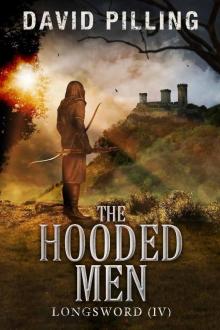 The Hooded Men
The Hooded Men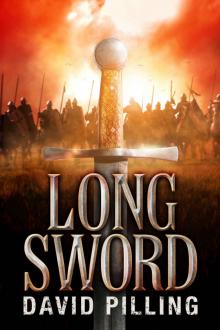 Longsword
Longsword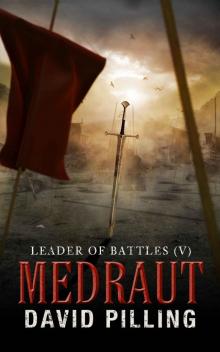 Medraut
Medraut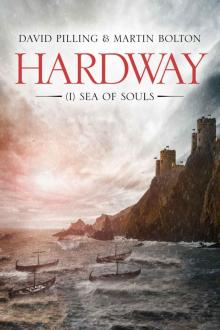 Hardway
Hardway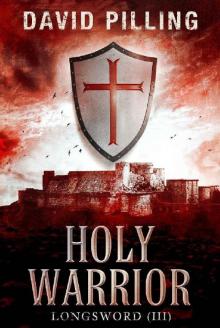 Holy Warrior
Holy Warrior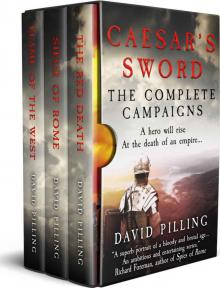 Caesar's Sword: The Complete Campaigns
Caesar's Sword: The Complete Campaigns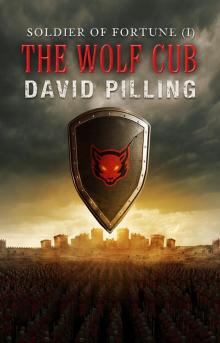 The Wolf Cub
The Wolf Cub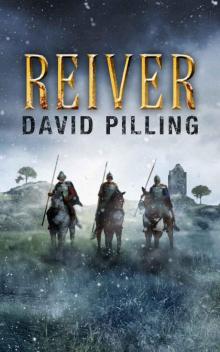 Reiver
Reiver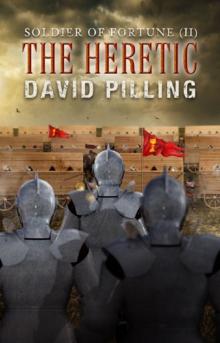 The Heretic
The Heretic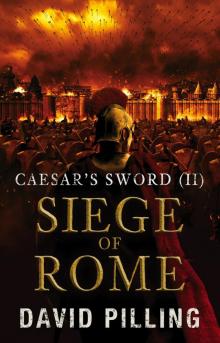 Siege of Rome
Siege of Rome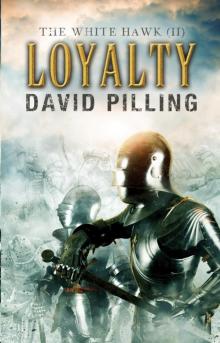 Loyalty
Loyalty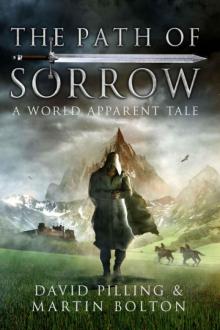 The Path of Sorrow
The Path of Sorrow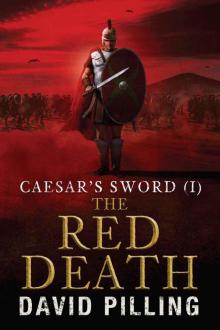 Caesar's Sword (I): The Red Death
Caesar's Sword (I): The Red Death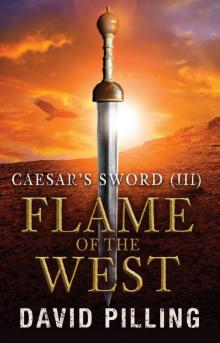 Flame of the West
Flame of the West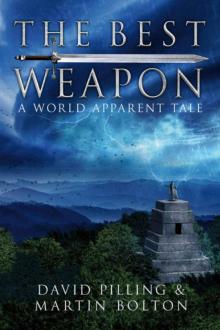 The Best Weapon
The Best Weapon Sacrifice
Sacrifice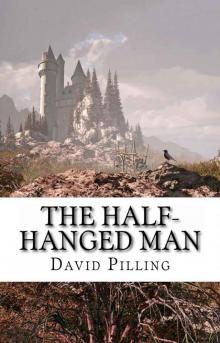 The Half-Hanged Man
The Half-Hanged Man